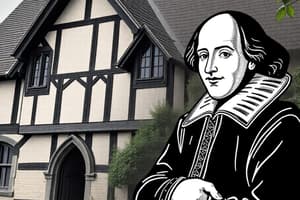Podcast
Questions and Answers
Who was known to be a patron of arts and learning during the Elizabethan Age?
Who was known to be a patron of arts and learning during the Elizabethan Age?
- Queen Elizabeth I (correct)
- Christopher Marlowe
- Thomas Nashe
- William Shakespeare
Which theatre became a symbol of the Elizabethan era's cultural vibrancy?
Which theatre became a symbol of the Elizabethan era's cultural vibrancy?
- Shakespeare's Globe
- Globe Theatre (correct)
- Theatre Royal Drury Lane
- The Rose Theatre
Which iconic figures shaped modern English literature during the Elizabethan Age?
Which iconic figures shaped modern English literature during the Elizabethan Age?
- Queen Elizabeth I (correct)
- Queen Mary I
- Queen Anne
- Queen Victoria
What was a popular venue where Shakespeare's plays were performed during the Elizabethan Age?
What was a popular venue where Shakespeare's plays were performed during the Elizabethan Age?
Who wrote captivating works that captured the imagination of their audiences during the Elizabethan Age?
Who wrote captivating works that captured the imagination of their audiences during the Elizabethan Age?
Who were some of the sonneteers during the Elizabethan era?
Who were some of the sonneteers during the Elizabethan era?
Which poetic form gained prominence during the Elizabethan era?
Which poetic form gained prominence during the Elizabethan era?
Which work explored the principles of a perfect society during the Elizabethan era?
Which work explored the principles of a perfect society during the Elizabethan era?
Which authors continued to build on the literary traditions established during the Elizabethan era?
Which authors continued to build on the literary traditions established during the Elizabethan era?
Who introduced new rules and conventions that shaped the evolution of the English language during the Elizabethan Age?
Who introduced new rules and conventions that shaped the evolution of the English language during the Elizabethan Age?
Flashcards are hidden until you start studying
Study Notes
English Literature History: A Nostalgic Journey Through the Elizabethan Age
Few eras in history have left an indelible mark on the literary landscape quite like the Elizabethan Age. Spanning from the mid-16th century to the early 17th century, the reign of Queen Elizabeth I (1558-1603) was a beacon of cultural and artistic growth for England. This thriving period witnessed the birth of some of the greatest literary works and iconic figures that shaped modern English literature.
Queen Elizabeth I: The Intellectual Patron
The Elizabethan Age's literature can be attributed to the confluence of several factors, including the strong support of the reigning monarch, Queen Elizabeth I. She was known to be a patron of arts and learning, encouraging a vibrant literary scene that flourished under her watch.
Theatre and Drama
The Elizabethan stage was a throbbing heart of English literature. Playwrights like William Shakespeare, Christopher Marlowe, Thomas Nashe, and Thomas Heywood wrote captivating works that captured the imagination of their audiences. The Globe Theatre, a popular venue where Shakespeare's plays were performed, became a symbol of the Elizabethan era's cultural vibrancy.
Shakespearean plays, including masterpieces such as "Hamlet," "Macbeth," and "Romeo and Juliet," were not only celebrated for their narrative depth and poetic beauty but also for their exploration of human emotions and societal issues. Shakespearean drama continues to resonate today, remaining a cornerstone of English literature.
Sonnets and Poetry
The Elizabethan era was also a golden age of poetry. Sonnets, a 14-line poetic form that gained prominence during this time, were crafted with emotional precision and thematic intricacy. Sonneteers such as Shakespeare, Sir Philip Sidney, and Sir Thomas Wyatt, among others, engaged in the art of verse with passion and finesse, creating works that are enduring in their beauty and wisdom.
Prose and Nonfiction
The Elizabethan era also fostered a thriving nonfiction scene. Works such as Sir Thomas More's "Utopia," a utopian narrative that explored the principles of a perfect society, and Sir Francis Bacon's "The Advancement of Learning," an ambitious work that outlined the foundations of modern science, continue to be influential literary contributions to this day.
The Art of Language and Grammar
During the Elizabethan Age, English language and grammar underwent significant transformations. The works of grammarian Richard Mulcaster, lexicographer Henry Cockerham, and playwright Ben Jonson introduced new rules and conventions that would shape the evolution of the English language.
The Elizabethan Legacy
The Elizabethan era left an indelible mark on English literature. Its influence can be seen in subsequent centuries, with authors such as John Milton, Samuel Taylor Coleridge, and William Wordsworth continuing to build on the literary traditions established during this time.
The Elizabethan era's literary output remains a treasure trove of human emotion, intellectual exploration, and artistic expression. The works of Shakespeare, Marlowe, Sidney, and others, continue to be celebrated and studied today, offering a window into the rich cultural and intellectual landscape of the Elizabethan Age.
In conclusion, the Elizabethan era is a shining example of the power of literature to inspire, inform, entertain, and delight. By examining the works of this golden age, we can better understand the foundations of modern English literature and the impact that it continues to have on our world today.
Studying That Suits You
Use AI to generate personalized quizzes and flashcards to suit your learning preferences.




